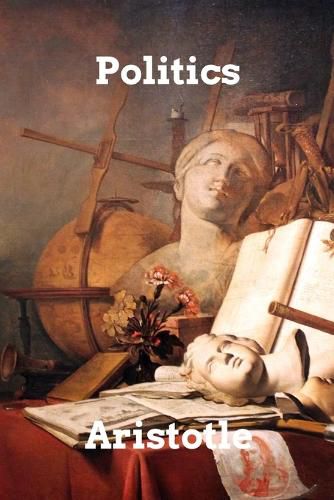Readings Newsletter
Become a Readings Member to make your shopping experience even easier.
Sign in or sign up for free!
You’re not far away from qualifying for FREE standard shipping within Australia
You’ve qualified for FREE standard shipping within Australia
The cart is loading…






This title is printed to order. This book may have been self-published. If so, we cannot guarantee the quality of the content. In the main most books will have gone through the editing process however some may not. We therefore suggest that you be aware of this before ordering this book. If in doubt check either the author or publisher’s details as we are unable to accept any returns unless they are faulty. Please contact us if you have any questions.
Politics is a work of political philosophy by Aristotle, a 4th-century BC Greek philosopher. The end of the Nicomachean Ethics declared that the inquiry into ethics necessarily follows into politics, and the two works are frequently considered to be parts of a larger treatise-or perhaps connected lectures-dealing with the "philosophy of human affairs". The title of Politics literally means "the things concerning the ????? polis", and is the origin of the modern English word politics. The literary character of the Politics is subject to some dispute, growing out of the textual difficulties that attended the loss of Aristotle's works. Book III ends with a sentence that is repeated almost verbatim at the start of Book VII, while the intervening Books IV-VI seem to have different flavor from the rest; Book IV seems to refer several times back to the discussion of the best regime contained in Books VII-VIII.[5] Some editors have therefore inserted Books VII-VIII after Book III. At the same time, however, references to the "discourses on politics" that occur in the Nicomachean Ethics suggest that the treatise as a whole ought to conclude with the discussion of education that occurs in Book VIII of the Politics, although it is not certain that Aristotle is referring to the Politics here
$9.00 standard shipping within Australia
FREE standard shipping within Australia for orders over $100.00
Express & International shipping calculated at checkout
This title is printed to order. This book may have been self-published. If so, we cannot guarantee the quality of the content. In the main most books will have gone through the editing process however some may not. We therefore suggest that you be aware of this before ordering this book. If in doubt check either the author or publisher’s details as we are unable to accept any returns unless they are faulty. Please contact us if you have any questions.
Politics is a work of political philosophy by Aristotle, a 4th-century BC Greek philosopher. The end of the Nicomachean Ethics declared that the inquiry into ethics necessarily follows into politics, and the two works are frequently considered to be parts of a larger treatise-or perhaps connected lectures-dealing with the "philosophy of human affairs". The title of Politics literally means "the things concerning the ????? polis", and is the origin of the modern English word politics. The literary character of the Politics is subject to some dispute, growing out of the textual difficulties that attended the loss of Aristotle's works. Book III ends with a sentence that is repeated almost verbatim at the start of Book VII, while the intervening Books IV-VI seem to have different flavor from the rest; Book IV seems to refer several times back to the discussion of the best regime contained in Books VII-VIII.[5] Some editors have therefore inserted Books VII-VIII after Book III. At the same time, however, references to the "discourses on politics" that occur in the Nicomachean Ethics suggest that the treatise as a whole ought to conclude with the discussion of education that occurs in Book VIII of the Politics, although it is not certain that Aristotle is referring to the Politics here